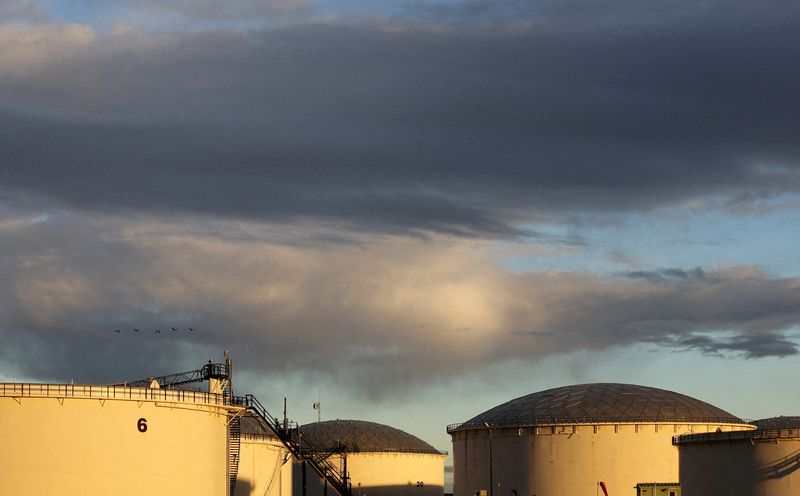By Scott DiSavino
NEW YORK (Reuters) - Oil prices were little changed on Monday as markets balanced an expected drop in demand due to mass testing for COVID-19 in China against ongoing concerns over tight supply.
Brent (LCOc1) futures for September delivery gained 8 cents, or 0.1%, to settle at $107.10 a barrel, while U.S. West Texas Intermediate (WTI) crude fell 70 cents, or 0.7%, to settle at $104.09.
With the U.S. Federal Reserve expected to keep raising interest rates, open interest in New York Mercantile Exchange (NYMEX) futures fell on July 7 to its lowest since October 2015 as investors cut back on risky assets.
Last week, oil speculators cut their net long futures and options positions on the NYMEX and Intercontinental Exchanges to their lowest since April 2020.
"The oil market is being pulled in two directions with exceedingly tight physical fundamentals set against forward-looking demand concerns and signs of price-induced demand destruction," analysts at EBW Analytics said in a note.
The market was rattled earlier in the session by news that China had discovered its first case of a highly transmissible Omicron subvariant in Shanghai that could lead to another round of mass testing, which would hurt fuel demand.
"The combined impact of concerns of global economic slowdown and a renewed COVID outbreak could hardly come at a worse time for oil markets," Investec Risk Solutions said in a note.
Also putting pressure on oil was a rise in the U.S. dollar against a basket of other currencies to its highest since October 2002. A stronger dollar reduces demand for oil by making the fuel more expensive for buyers using other currencies.
Euro zone finance ministers said the fight against inflation was the current priority despite dwindling growth in the bloc, as they were informed of a deteriorating economic outlook by the European Commission.
The market remains jittery about plans by Western nations to cap Russian oil prices, with Russian President Vladimir Putin warning that further sanctions could lead to "catastrophic" consequences in the global energy market.
JP Morgan said the market was caught between concern over a potential halt to Russian supplies and a possible recession.
"Macro risks are becoming more two-sided. A 3 million barrel (bbl) per day retaliatory reduction in Russian oil exports is a credible threat and if realized will drive Brent crude oil prices to roughly $190/bbl," the bank said in a note.
"On the other hand, the impact of substantially lower demand growth under recessionary scenarios would see the Brent crude oil price averaging around $90/bbl under a mild recession and $78/bbl under a scenario of a more severe downturn."
Questions also remain about how long more crude will flow from Kazakhstan via the Caspian Pipeline Consortium (CPC).

Supply has continued so far on the pipeline, which carries about 1% of global oil, with a Russian court overturning an earlier ruling suspending operations there.
Brazilian President Jair Bolsonaro, meanwhile, said that a deal was close with Moscow to buy much cheaper diesel from Russia.